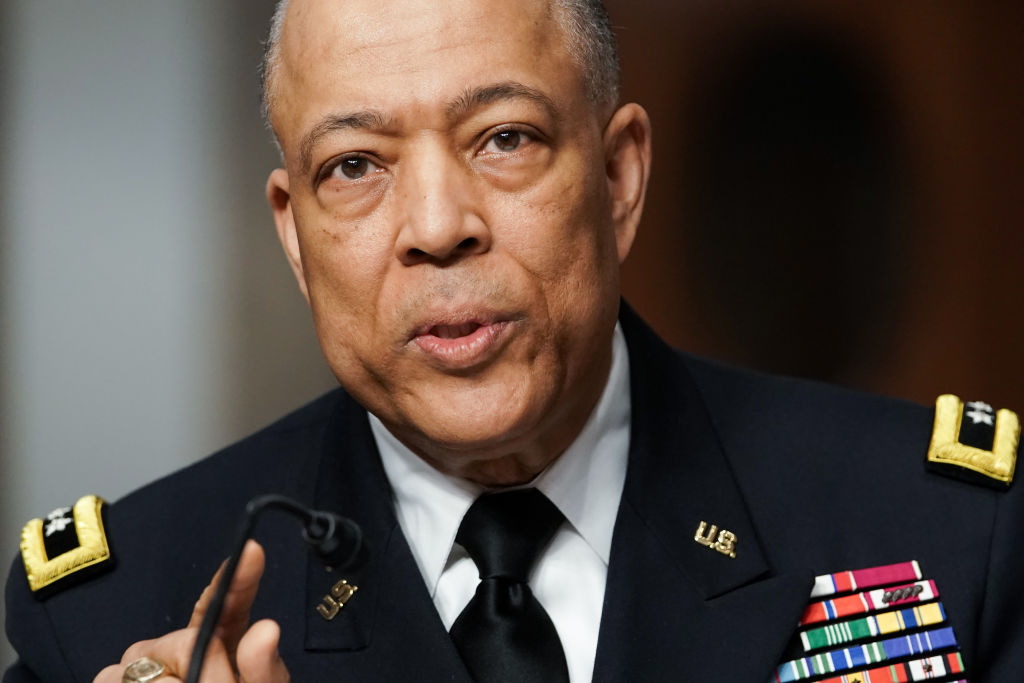D.C. National Guard commander highlights differences in deployment approval process for summer protests, Jan. 6 riot


A free daily email with the biggest news stories of the day – and the best features from TheWeek.com
You are now subscribed
Your newsletter sign-up was successful
Congressional testimony about the Jan. 6 Capitol riot from Maj. Gen. William Walker, the commanding general of the D.C. National Guard, began with a "brutal" line of questioning from Sen. Gary Peters (D-Mich.) on Wednesday.
Walker himself wasn't the target of Peters' questions. Rather, the senator asked the major general how quickly he was able to get approval to deploy troops in the nation's capital from the Pentagon in June during the protests against police brutality and racial injustice. Walker confirmed he got the go-ahead immediately. But when Peters followed up by asking about the timeline on Jan. 6, when a pro-Trump mob stormed the Capitol, Walker testified that he did not receive immediate approval, highlighting the differences in responses to the events.
Walker said he alerted Army senior right after former Capitol Police Chief Steven Sund requested assistance from guardsmen, whom Walker had moved closer to the Capitol in anticipation of the situation, but he didn't receive the required approval from then-acting Defense Secretary Christopher Miller until over three hours later. The major general added that he received an "unusual" letter the day before the insurrection restricting him from deploying any Quick Reaction Force service members without the explicit approval of then-Army Secretary Ryan McCarthy. Read more at NPR.
The Week
Escape your echo chamber. Get the facts behind the news, plus analysis from multiple perspectives.

Sign up for The Week's Free Newsletters
From our morning news briefing to a weekly Good News Newsletter, get the best of The Week delivered directly to your inbox.
From our morning news briefing to a weekly Good News Newsletter, get the best of The Week delivered directly to your inbox.
A free daily email with the biggest news stories of the day – and the best features from TheWeek.com
Tim is a staff writer at The Week and has contributed to Bedford and Bowery and The New York Transatlantic. He is a graduate of Occidental College and NYU's journalism school. Tim enjoys writing about baseball, Europe, and extinct megafauna. He lives in New York City.
-
 Political cartoons for February 16
Political cartoons for February 16Cartoons Monday’s political cartoons include President's Day, a valentine from the Epstein files, and more
-
 Regent Hong Kong: a tranquil haven with a prime waterfront spot
Regent Hong Kong: a tranquil haven with a prime waterfront spotThe Week Recommends The trendy hotel recently underwent an extensive two-year revamp
-
 The problem with diagnosing profound autism
The problem with diagnosing profound autismThe Explainer Experts are reconsidering the idea of autism as a spectrum, which could impact diagnoses and policy making for the condition
-
 Key Bangladesh election returns old guard to power
Key Bangladesh election returns old guard to powerSpeed Read The Bangladesh Nationalist Party claimed a decisive victory
-
 Epstein files topple law CEO, roil UK government
Epstein files topple law CEO, roil UK governmentSpeed Read Peter Mandelson, Britain’s former ambassador to the US, is caught up in the scandal
-
 Iran and US prepare to meet after skirmishes
Iran and US prepare to meet after skirmishesSpeed Read The incident comes amid heightened tensions in the Middle East
-
 EU and India clinch trade pact amid US tariff war
EU and India clinch trade pact amid US tariff warSpeed Read The agreement will slash tariffs on most goods over the next decade
-
 Israel retrieves final hostage’s body from Gaza
Israel retrieves final hostage’s body from GazaSpeed Read The 24-year-old police officer was killed during the initial Hamas attack
-
 China’s Xi targets top general in growing purge
China’s Xi targets top general in growing purgeSpeed Read Zhang Youxia is being investigated over ‘grave violations’ of the law
-
 Panama and Canada are negotiating over a crucial copper mine
Panama and Canada are negotiating over a crucial copper mineIn the Spotlight Panama is set to make a final decision on the mine this summer
-
 Why Greenland’s natural resources are nearly impossible to mine
Why Greenland’s natural resources are nearly impossible to mineThe Explainer The country’s natural landscape makes the task extremely difficult
